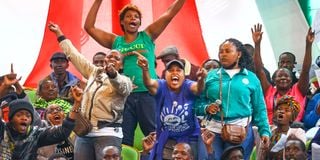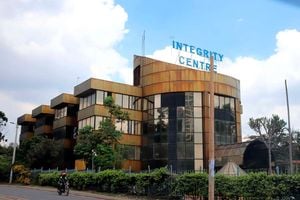Chaotic public input sessions could be DP Gachagua’s saving grace

Youths express themselves during the public participation exercise on the proposed impeachment of Deputy President Rigathi Gachagua by the National Assembly at Bomas of Kenya, Nairobi on October 4, 2024.
By Masolo Mabonga
Kenyan courts have been ruthless when dealing with cases involving public participation.
Judges have made it clear that public participation cannot be a mere PR exercise but rather a meaningful, inclusive, substantive, and transparent process that adheres to the Constitution, particularly Article 10. Justice Isaac Lenaola has been critical of institutions that take public participation exercise for granted and treat it as a mere formality.
On many occasions, he has reminded those in leadership that public input is at the core of our democracy, “and without it, democracy becomes hollow”. In his judgments, Mr Lenaola, and many other judges who have dealt with this matter, emphasise that “the courts would not hesitate to strike down legislation or policy where it is clear that public participation was not met.” The Finance Act, 2023, is the latest to suffer that fate.
As the country prepares to witness the impeachment of Deputy President Rigathi Gachagua, the first since Independence, the question of public participation will undoubtedly come into play. To ensure the process is foolproof and watertight, the National Assembly invited Kenyans to public participation on Friday but extended it to Saturday after the High Court in Kerugoya directed that the process be carried out at constituency levels to ensure more Kenyans get a chance to share their views.
Regrettably, this process was marred by chaos, hooliganism and bribery allegations. In some places, politicians took over and ran the show, dictating who gets a chance to speak, when, and how. At Bomas, for instance, activist Morara Kebaso was denied the microphone, roughed up, beaten, and thrown out.
In Nyeri, Murang'a, and Nakuru, some locals claimed local leaders attempted to bribe them with Sh500 to sign the form supporting Gachagua's impeachment. None of them, however, provided evidence. There were also widespread allegations of forged and marked forms at some centres designated for the exercise. Complaints were also raised about the swift manner in which the exercise was conducted.
The courts say there should be clear and deliberate efforts to include the public in decision-making, and their views should matter. These are some of the standards against which public participation in Gachagua’s impeachment will be measured. The organisers are expected to account for why some views were accepted and others rejected.
Masolo Mabonga, a digital journalist and law student at MKU (Nairobi)




